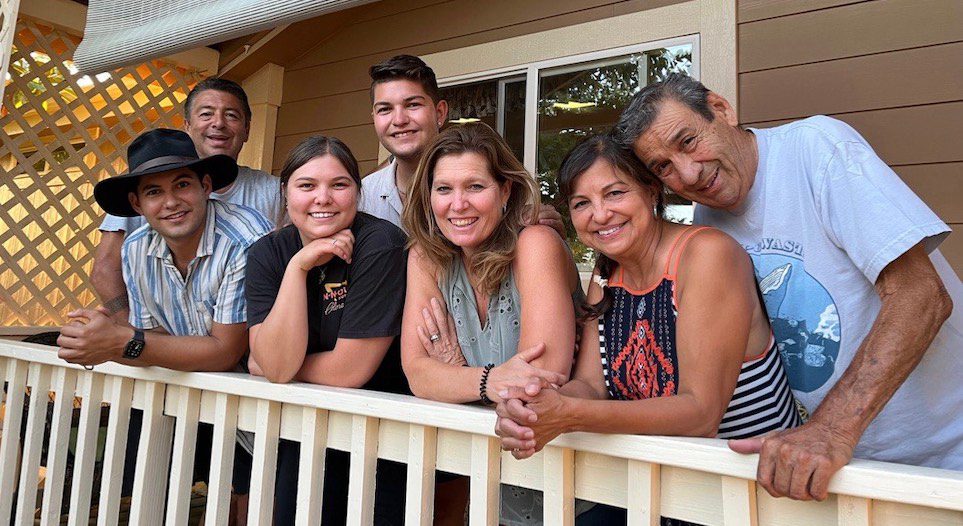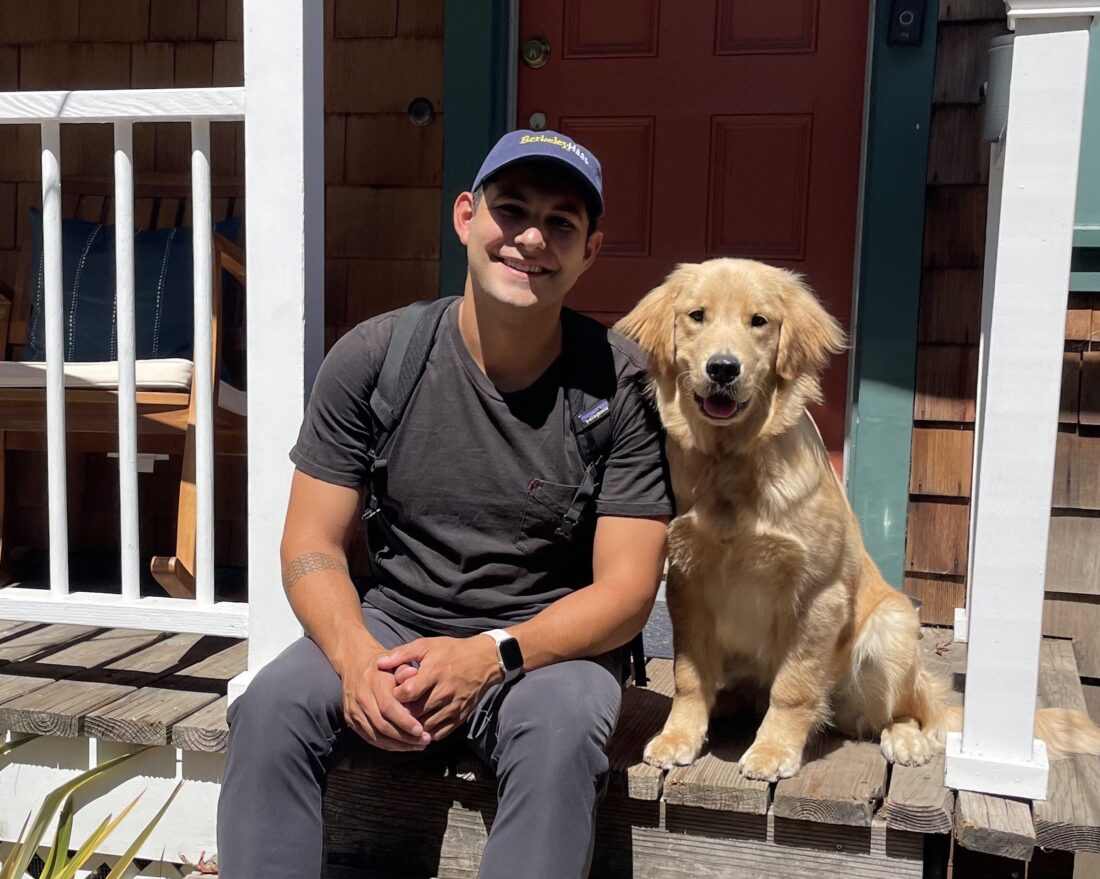Haas Voices is a first-person series based on interviews with diverse members of the Haas community.

Hayden Estes
Hayden Estes, MBA 26, a member of the La Jolla Band of Luiseño Indians, plans to focus on creating intergenerational wealth for Native American tribes after he graduates. An established accountant before he came to Haas, Estes will be one of the first Berkeley Haas MBA students to receive full-tuition aid next year under the new University of California Native American Opportunity Plan.
“My father grew up on the Luiseño Indian reservation. As a kid, he would put a stick in the ground and draw a line in the sand. My grandma would go to work and would tell him that when the shadow crosses that line, you start walking to school.
The Luiseno tribe lives just outside of Escondido, about an hour east from the coast. Our tribal land used to be located more to the west, but we were pushed a little more east, and there’s definitely a temperature change. It can get hot there.
There are many areas across the U.S. that are tough to live in, and a lot of reservations are in those areas. Ours is right by Palomar Mountain, which is beautiful, and a lot of people will hike there or travel through to go to the desert. They’ll camp or go off-roading. Neighboring towns include Temecula, which is wine country, and Julian, which is famous for pies and apple picking.
People drive through reservations today, and it’s really just kind of a pass through. I would love for reservations across the U.S. to be destinations.
My ideas about giving back to the Native American community come partly from visiting my grandpa, who still lives on the reservation. He didn’t have internet access until two years ago, and he got a cell phone last year. It will get to over 100 degrees, but he’ll only turn on the AC at certain hours to try to save money here and there.
My father left the reservation for college when he got a baseball scholarship to play for Chico State. Athletics were a big part of his life, and getting the scholarship was really his only opportunity to go. Both he and my mom earned education degrees at Chico State. There were job opportunities in Colorado in the early 1990s, so they made the move and ended up working for the same public school district. I grew up in Broomfield, Colorado, between Boulder and Denver. With parents for teachers, I think there’s a certain standard that you don’t really want to cross. They definitely instilled a value of education.

Hayden Estes (left) with his family. His father left the Luiseño Indian reservation to attend college.
I have a younger sister at the Colorado School of Mines studying geology and a younger brother in Denver who graduated from Denver University and is a social activist. I’m more interested in funding my causes, whereas he’s more boots-on-the-ground. The dinner table definitely got a little contentious at points, but I think we always want to achieve the same thing.
As an undergraduate at the University of San Diego, I thought I wanted to major in biology. My dad was a biology teacher, and my mom taught seventh-grade science. But when you get your first C-minus in an intro course, it’s eye opening. Growing up, I loved numbers and puzzles, Monopoly and Sudoku. So when I had to choose a major, I thought accounting would align because it’s part of everyday life.
After I graduated, I established myself as an accountant at KPMG, but I hit this point where I asked what else was out there. Applying to business school was on my checklist for a long time.
So I applied to Haas through The Consortium, a great program that’s enhancing diversity and inclusion in business schools. Through The Consortium, you’re able to look at the different member schools and choose which ones you’re really interested in. I didn’t know much about Haas, but a second-year student reached out to me and said, ‘Hey, I’d love to chat with you if you have any questions.’ It was impactful for me to talk to her and get her insights. She told me about the focus on diversity and inclusion within the school and the Bay Area and the great alumni base. It’s super exciting to have a football team, too.

Estes (with puppy, Daisy) wants to use his MBA to alleviate problems on reservations. “The question for our tribes is: How do we create our own opportunities? Do you build casinos? What do you try to do to help the people of your tribe without losing that culture?”
When I learned this year about this program that the UC system established to pay Native Americans’ tuition, I thought it was phenomenal opportunity, considering that I worked three jobs during undergrad — as a barista, at a surf-bike shop, and as a waiter to pay for school.
It’s just so hard to start off in debt. It’s like starting off a game of Monopoly with debt instead of collecting $200 when you pass ‘Go’. It makes everything so much harder. And it can be particularly tough for Native folks who want to go back to their tribes to start a business with $100,000 in debt.
The retention rate is also low for Indigenous students. It’s so hard to go from a tight-knit community on your reservation to a big school like Berkeley. So, I am interested in increasing the graduation rate for Indigenous students. At the start of the year, I reached out to Patrick Naranjo, the director of the American Indian Graduate Program, to ask if there was anything I could do for our undergrads, whether that’s teaching accounting or helping with accounting classes.
I want to find a way to alleviate problems on reservations. The question for our tribes is: How do we create our own opportunities? Do you build casinos? What do you try to do to help the people of your tribe without losing that culture?
A lot of first-years have drive and passion for sustainability, and I am here to figure out how we can generate sustainable energy for tribes through solar. There’s so much opportunity to set up solar panels and wind turbines on reservations across the U.S.
I’ve been talking with my classmates, which is helping me gain the confidence to work on these solutions. I’m also interested in understanding more about real estate investing. I’m learning new skills through my core class in negotiations, which ties into negotiating real estate deals.
A lot of tribes have casinos, which generate income. But now, with legalized online gambling, you can just pull out your app in a lot of states to gamble. That definitely is a hit to casinos. So, it’s now just about trying to find other ways for tribes to get sustainable perpetual income. The thought would be to have all tribes pool their money together with the purpose to acquire real estate in metropolitan areas such as Albuquerque, Denver, and Phoenix.
An MBA at Haas will help me develop the skills and leadership expertise needed to make a more meaningful impact on my community. And once that rental income is coming in every month it will go right back to the tribes to build parks and community centers and schools.”
Posted in: